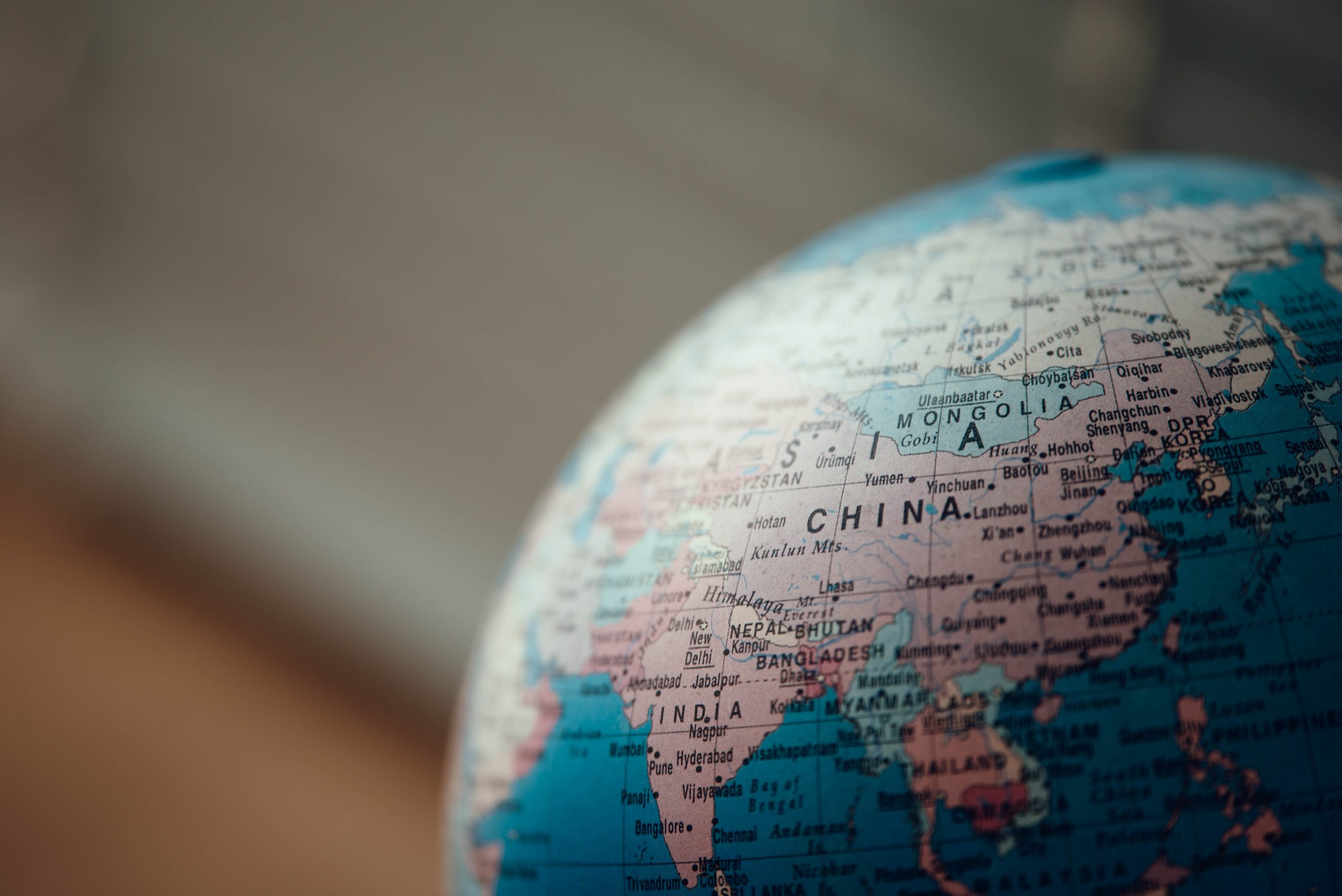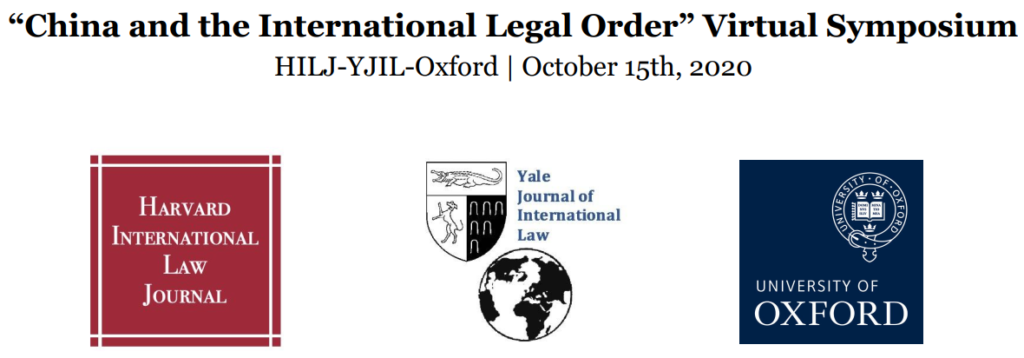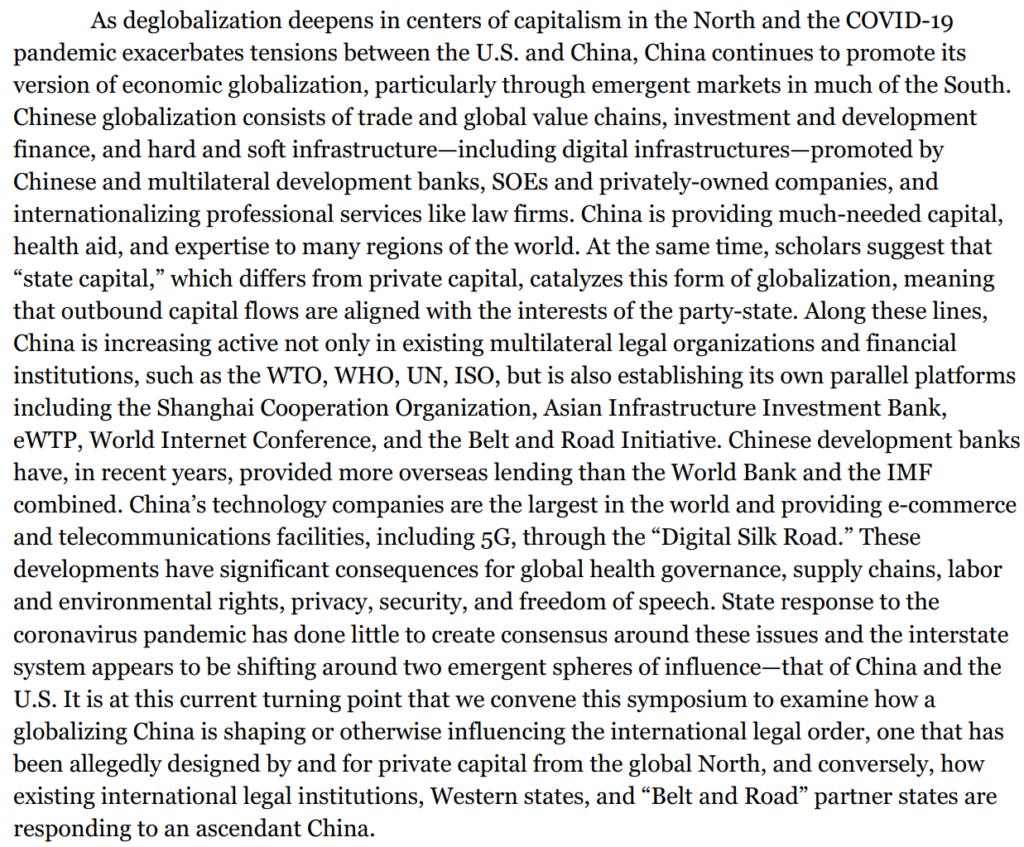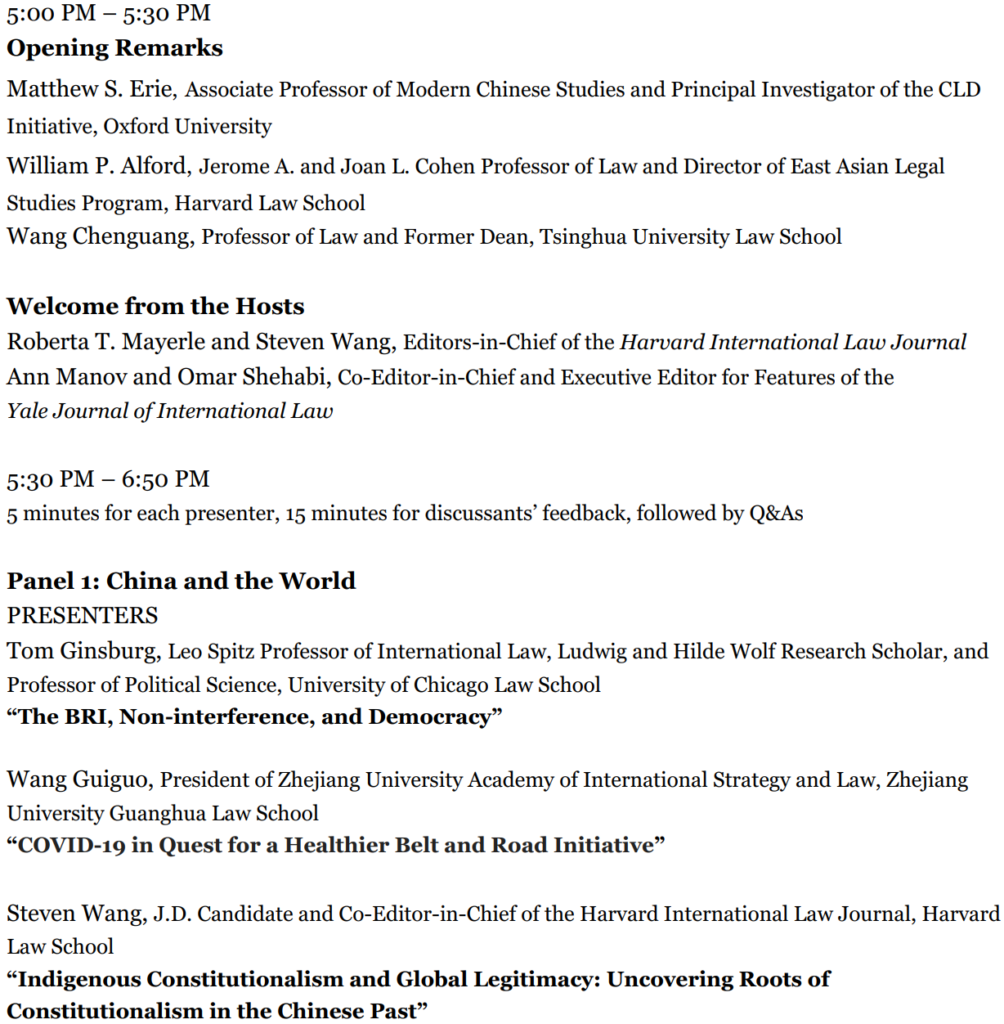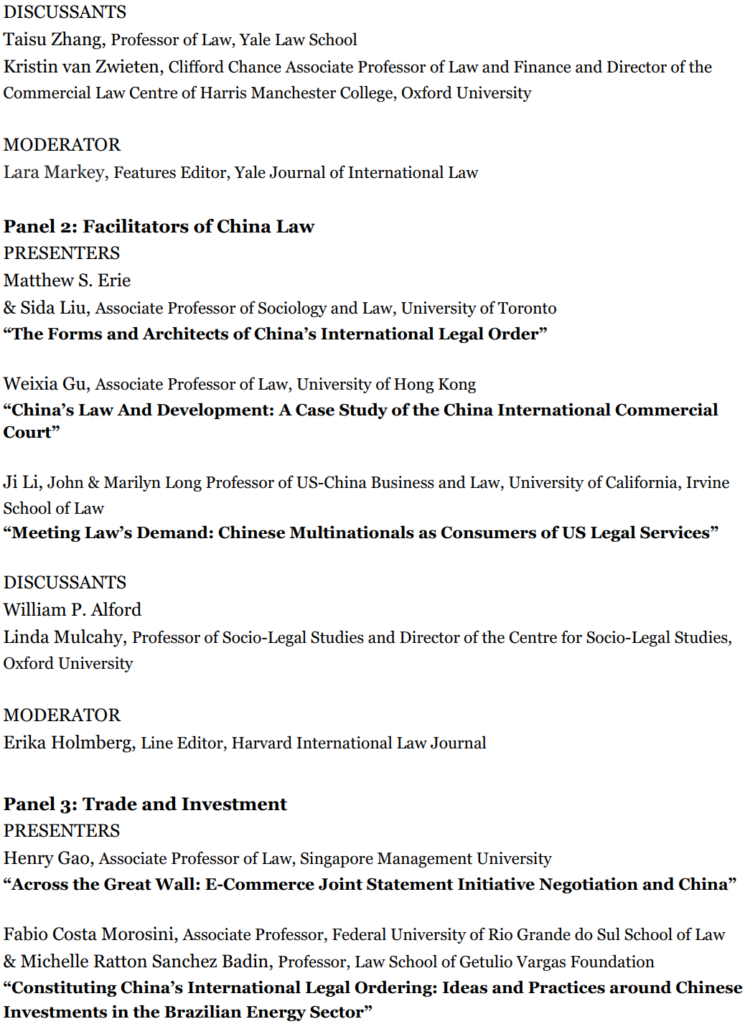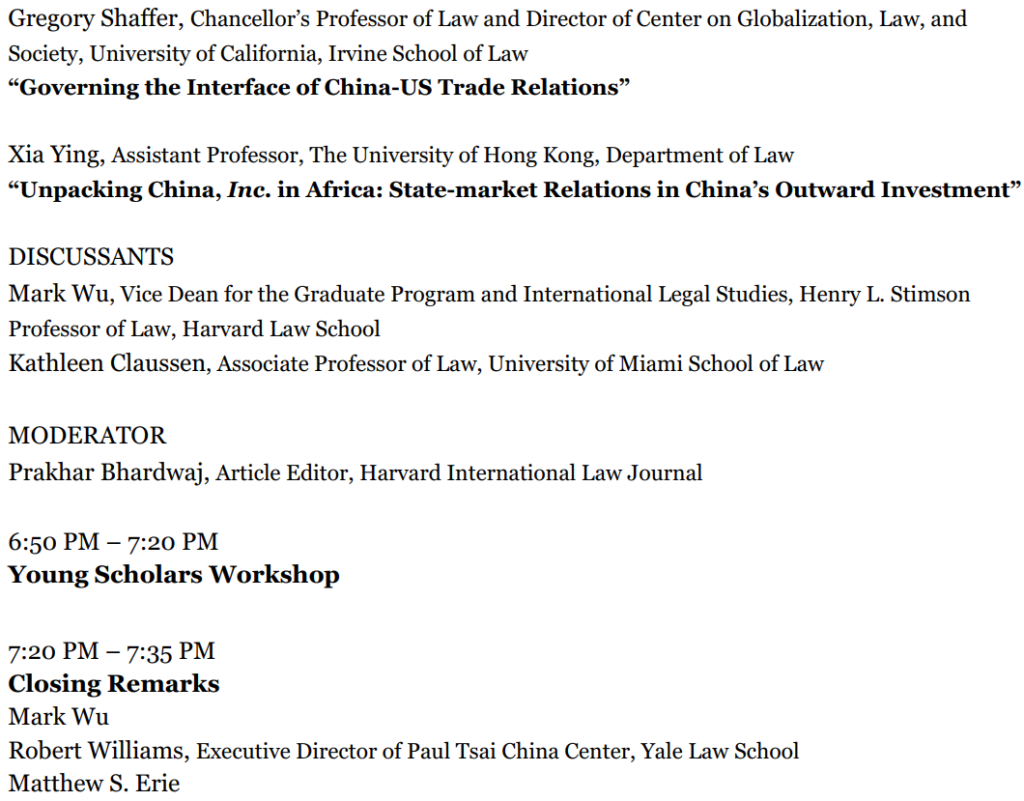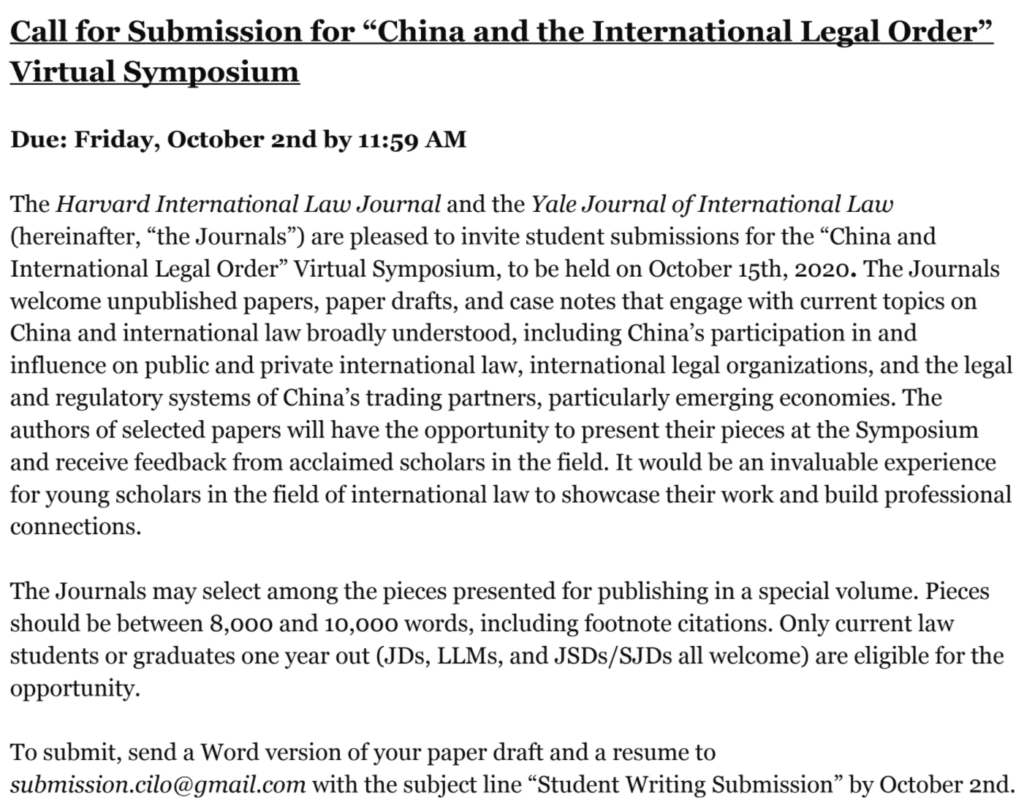Symposium: China and the International Legal Order
Introduction to the “China and the International Legal Order”
2021 Joint Symposium Issues
From international investment and trade and to human rights and multilateralism, China has become central to debates—in government offices and policy circles, academic universities, and corporate boardrooms—about the future of the international legal order, particularly one under stress during one of the worst pandemics in modern history in terms of mortality and economic fallout. Prior to the COVID-19 pandemic outbreak in late 2019, it was unquestionable that China was becoming more active in the international legal order. By international legal order (“ILO”), we mean a set of institutions and rules, including international organizations and a framework of international laws based on treaties among other sources, which organize interstate behavior across a wide range of activities, such as commerce and trade, diplomacy, war, human rights, and development. The PRC has grown economically over the past forty years within this system, a system that many would say does not necessarily share all of the values espoused by the leadership of contemporary China. In turn, China has increased its participation in both public and private international law, including, respectively, by active involvement in international organizations and by becoming one of the largest capital exporters in the world. Supporters of China’s engagement point to the public goods China provides through investment and trade, as organized through global value chains, providing critical infrastructures for economies sorely in need. Critics, however, protest that China’s involvement in such bodies as the United Nations Human Rights Council normalizes its approach to governance and human rights, given on-going concerns about events in Xinjiang, Tibet, and Hong Kong. The U.S.-China trade war and the COVID-19 pandemic have further strained the relationship between China and the ILO.
All of this raises questions: How does an increasingly active China position itself within the ILO? Is China a revisionist state that seeks to conform this order to its own values, is it building an alternative order, or does it seek to operate within the status quo? What, in short, is the future of this order, particularly after COVID-19?
On October 15, 2020, scholars from a number of countries, including China, the United States, and other jurisdictions convened a virtual symposium entitled “China and the International Legal Order.” The symposium was the result of a first-ever collaboration between the Harvard International Law Journal, Yale Journal of International Law, and the University of Oxford, specifically, the “China, Law and Development” project and the Commercial Law Centre. The goal of the symposium was to create a platform for discussion between these scholars on the state of the field in China’s relationship with the ILO. The dialogue intentionally worked both horizontally and vertically. As to the former, whereas the U.S.-China relationship remains central to international politics and law, we emphasized the need to learn about mainland China from those outside of this relationship, and so invited scholars from Brazil, Singapore, Hong Kong, and the United Kingdom. The symposium further sought to stimulate vertical conversations by including not just established scholars but also mid-career and junior ones, as well, including current legal students. One shared belief of the organizers of the symposium was that it is vital for the next generation of China law scholars to be able to engage with those from different jurisdictional, disciplinary, cultural, and even ideological backgrounds.
There are eleven articles in total between the joint symposium issues (four published by the Harvard International Law Journal and seven published by the Yale Journal of International Law) that resulted from the virtual meeting. The articles vary in their perspectives, focus, and methodologies. Collectively, the authors share a commitment to nuancing the perception of China and its role in the ILO. Generally, the articles can be categorized in three ways. The first type adopts, broadly, a comparative lens to assess how China’s position on international law issues or norms relates to established practice. The second type analyses the effects of China’s involvement in the ILO on other jurisdictions. The third focuses on the question of lawyers as the stewards of the ILO. In the remainder of this introduction, we briefly gloss these types.
Beginning with the first type, in support of the idea that China’s economic and political system differs from those of the states that established the ILO, a number of scholars discuss either the frictions between the Chinese system and ILO or possible compatibilities. On the side of the former, Henry Gao in his article “WTO Reform and China: Defining or Defiling the Multilateral Trading System?” provides an historical review and contemporary assessment of China’s place in the WTO system. He diagnoses the challenges and tensions and notes how central China’s system has become in shaping discussions about WTO reform. Likewise, Weixia Gu in her “China’s Law and Development: A Case Study of the China International Commercial Court,” juxtaposes the Beijing Washington Consensus and the Beijing Consensus finding that China is building international dispute resolution mechanisms that incorporate not only soft law but also hard law.
Aliki Semertzi and Yilin Wang in their co-authored article, “China: A Disqualified yet Winding Influencer of the International Legal Order,” observe that whereas the existing neoliberal order largely dismisses the PRC because its understanding of rights does not privilege civil and political rights, China is nonetheless contributing to global health governance through its “Health Silk Road” and untied aid. Marielle Coutrix in her “Reflection: Accountability-Based, Data-Driven Governance through the Lens of Chinese Environmental Reform” similarly calls for learning from China but does so in a way so as to close the gap between, in her study, China’s social credit system, specifically, as it applies in the environmental field, and data-governance indicators like credit scores as a feature of modern life anywhere. In a similar vein, Steven Wang takes an historical turn in his “Indigenous Constitutionalism and Global Legitimacy: Excavating the Roots of Chinese Constitutionalism” to locate a number of constitutional norms in traditional Chinese political thought and practice that provide a means to rethink the possibilities for Chinese constitutionalism, a key ingredient to the Chinese state’s international legitimacy. In this type, each author assesses the real or perceived differences between China’s principles, values, and institutions and those of the ILO as it presently exists, suggesting points of reconciliation, reflection, or ongoing conflict.
The second type of articles tackles the thorny issue of how China’s participation in the ILO may impact other jurisdictions. Joshua M. Feinzig’s “Chinese Canons and the Basic Law: Tracing the Interpretive Shifts of the National People’s Congress Standing Committee” starts close to home—that is, in examining the relationship between mainland China and the Hong Kong Special Administrative Region, finding that the PRC National People’s Congress’s Standing Committee has shifted in its canonical approach to interpretation from one that was common-law friendly to one that is increasingly based on the Chinese civil law. Tom Ginsburg in his “The BRI, Non-Interference, and Democracy,” also focuses on China’s influence on Hong Kong through the 2020 National Security Law but also addresses the broader question of how the Belt and Road Initiative (“BRI”) may have subtle and incidental effects on democracies in host states the world over. Whereas Ginsburg strikes a cautiously critical view, Michelle Ratton Sanchez-Badin and Fabio Morosini in their co-authored “International Economic law by Other Means: A Three-Level Matrix of Chinese Investments in Brazil’s Electric Power Sector,” conclude based on their case study of the PRC state-owned enterprise State Grid’s acquisition of Companhia Paulista de Força e Luz that China’s legal tools of ILO are neither unique nor harmful. Each article shows how China’s impact on host states varies according to the relative bargaining power of that host state vis-à-vis China and its own relative level of legal-economic development, that is, its own domestic institutions.
Lastly, the third type of articles hones in on the role of lawyers (Chinese and non-Chinese) in managing and shaping China’s relationships within the ILO. Matthew S. Erie and Sida Liu in their co-authored article, “The Forms and Architects of China’s International Legal Order,” provide a broad conceptual framework for thinking through the role of lawyers in building China’s international economic relationships. The other articles of this type focus on different types of host states and lawyering therein. Ji Li’s “Meeting Law’s Demand: Chinese Multinationals as Consumers of U.S. Legal Services” shows how, in the case of Chinese investment in the United States, the legal needs of Chinese multi-national corporations are formed by the requirements of U.S. regulators. Lawrence J. Liu’s “The Rules of the (Belt and) Road: How Lawyers Participate in China’s Outbound Investment and Infrastructure Initiatives” highlights Chinese lawyers in BRI deals, mainly infrastructural and energy projects in low-income states, finding that while Chinese lawyers share a language with Anglo-American ones, they are nonetheless often co-participants in informing policy-making alongside the Chinese state. These articles spotlight the pivotal role of transactional and dispute resolution lawyers to assist Chinese enterprises in adapting to diverse regulatory environments, many which differ considerably from that of the home state.
Together, the articles in the joint symposium issues complicate received notions of China’s position in the ILO, provide conceptual, doctrinal, and policy arguments for fine-tuning the analysis, and provoke further lines for further research and inquiry. We hope that the joint symposium issues can serve as a springboard for additional investigation and dialogue and to raise the bar in our collective understanding of China’s evolving position in international law and politics.
Co-Organizers:
Matthew S. Erie
University of Oxford
Roberta T. Mayerle, Steven Wang, and Mitchell E. Wellman
Harvard Law School
Yale Law School
ARTICLES (Harvard International Law Journal)
WTO Reform and China: Defining or Defiling the Multilateral Trading System?
Henry Gao
The BRI, Non-interference, and Democracy
Tom Ginsburg
China’s Law and Development: A Case Study of the China International Commercial Court
Weixia Gu
International Economic Law by Other Means: A Three-level Matrix of Chinese Investments in Brazil’s Electric Power Sector
Michelle Ratton Sanchez-Badin & Fabio Morosini


